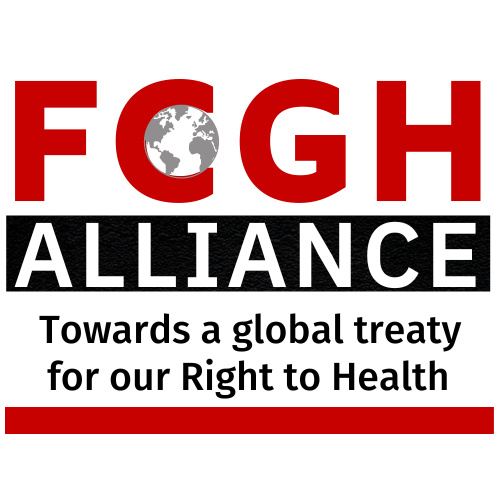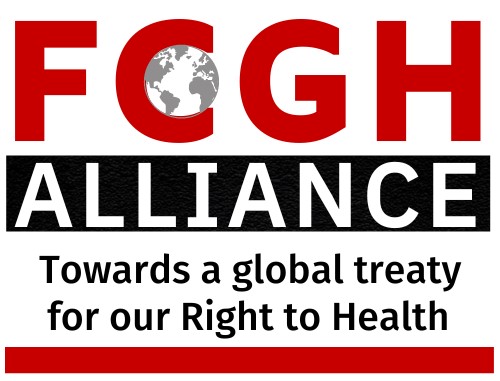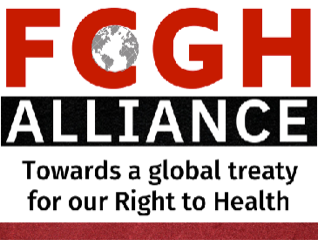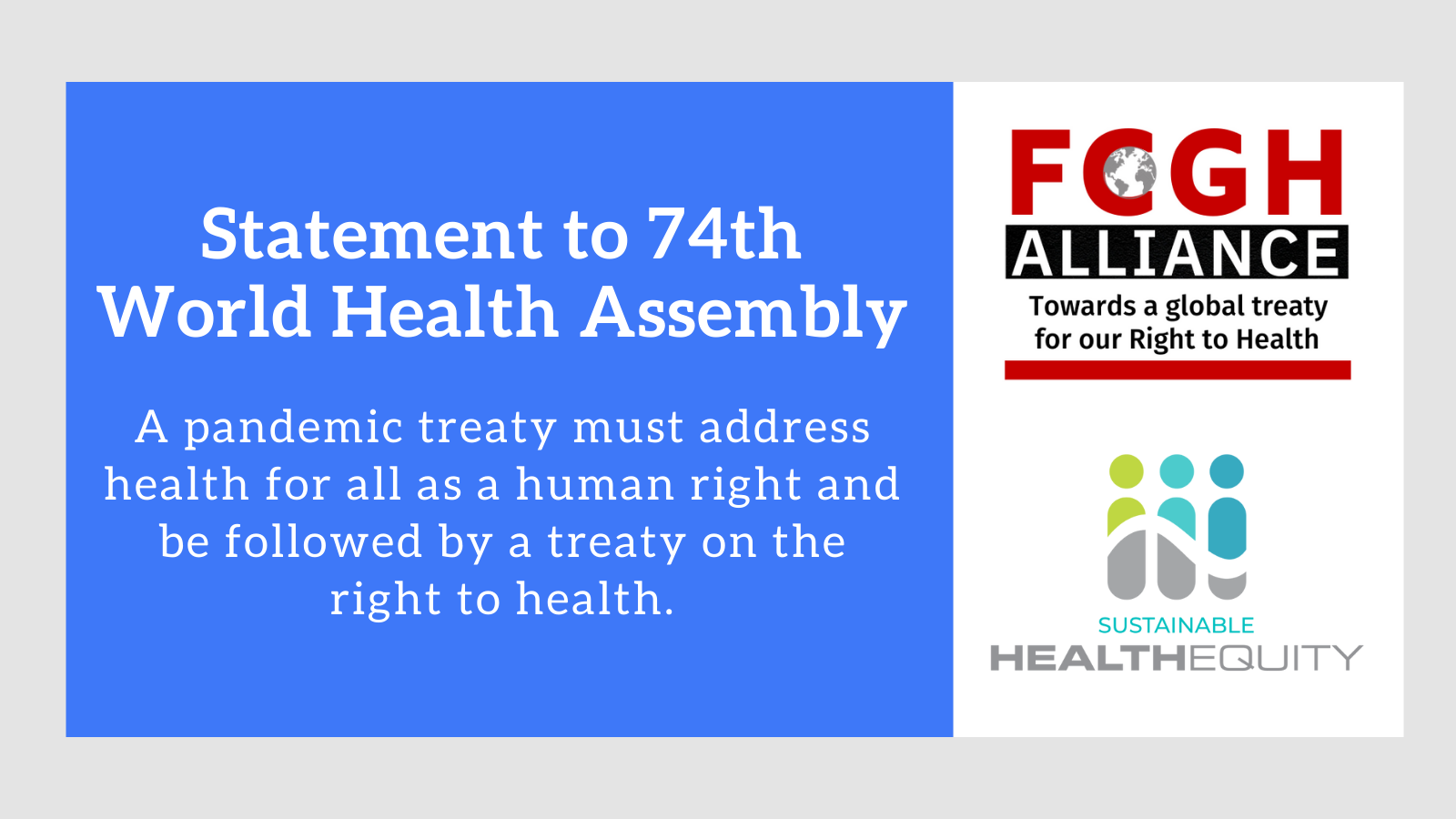A pandemic treaty must address health for all as a human right and be followed by a treaty on the right to health
The Sustainable Health Equity Movement (SHEM) Working Group on Human Rights and Equity and the Framework Convention on Global Health Alliance call on World Health Organization Member States participating in the Special Session 74th World Health Assembly to support the development of a rights and equity-based pandemic treaty that strengthens pandemic preparedness and response and addresses the failings of the global COVID-19 response.
We welcome the WHA Working Group Zero Draft Report, which recognizes the benefits of anchoring a pandemic treaty in the key principles of equity and right to health outlined in the WHO Constitution. This will entail a range of measures, from requiring marginalized communities to be part of pandemic planning to establishing effective mechanisms for the equitable distribution of vaccines and other medical technologies needed as part of a pandemic response, while also encompassing social protection. Negotiations themselves should include and prioritize marginalized populations, and certain industries may need to be excluded from participating in the negotiations.
The COVID-19 pandemic revealed and exacerbated health inequities between and within states. More than 5 million deaths due to COVID-19 have been reported globally, yet the real toll is almost surely more than twice that many and grows by the day. Poor and most marginalized communities have been the most affected. WHO Director-General Tedros Adhanom Ghebreyesus, addressing the World Health Summit last month, said, “The pandemic has demonstrated beyond doubt that health is not a luxury for the rich, or simply an outcome of development; it’s a fundamental human right, and the basis of social, economic and political stability.” He called for global solidarity as “No country can end the pandemic in isolation” and “no country can protect the health of its own people without working to protect the health of all people.”
Yet more will be required than even a rights- and equity-based pandemic treaty. Its confined scope means that there is little chance that it will encompass the changes to the national and global systems for health and their governance required not only for maximally effective pandemic prevention preparedness, and response, but also to respond to the deep, systemic, far-reaching health inequities that COVID-19 has laid bare. The proposed Framework Convention on Global Health (FCGH), which is firmly rooted in the right to health, including the principles of accountability, transparency, and equity, would embody just such a response. The pandemic treaty, reviving WHO’s use of its treaty-making powers, particularly if grounded in health and equity, could pave the way.
This FCGH could transform our health systems by putting human rights at the centre of health security. The right to health is included in a number of earlier human rights treaties, but as seen in the pandemic response, many states have failed to implement the right’s requirements. The FCGH would build on these earlier treaties, crystalizing their requirements in a single instrument and translating their mandates into practical terms, creating clear standards and specific mechanisms to accelerate implementation and enhance accountability. This would not only improve people’s health overall and help end the pandemic of health inequities, but also lead to far more effective responses to – and help countries prevent – pandemics and other health emergencies. For example:
- The FCGH would establish processes and standards to advance states’ responsibilities to ensure equal access for all to good quality health services and the determinants of health through equitable allocation of the maximum of available resources, such as inclusive, participatory processes to establish and monitor timelines, benchmarks, and targets towards these ends. This would enable health systems to reach all residents, improving disease surveillance and detection and facilitating universal rollout of pandemic interventions from testing to vaccination.
- Measures under the FCGH to advance health equity could include prioritizing poor and marginalized populations to minimize the impact of social and economic disruptions that may affect their right to health, such as the ability to eat enough nutritious food, through pandemic and other health emergency countermeasures during pandemics.
- The FCGH would ensure transparency and right to health accountability strategies and mechanisms, including at the community level, and standards for inclusive participation. These would enhance the population’s trust of health authorities, increasing compliance with sociobehavioral recommendations and mandates during pandemics, and ensure that people, including in marginalized communities, have the resources required to adhere to the public health measures required to protect themselves, their communities, and the entire population. It would also help protect against misuse of pandemic-related funding and could extend to vaccines and other health-related contracts.
- The right to health requirement for states to act within their maximum available resources towards the highest standard of health entails taking such low-cost measures as issuing forceful regulations to protect their populations against the disease and death that comes from unhealthy products, such as tobacco, sugary beverages, ultra-processed foods, and alcohol. Such actions could therefore be required under the FCGH. These products contribute to chronic conditions like diabetes, cardiovascular disease, respiratory diseases, and cancers that can make people more vulnerable to complications and death from pandemic diseases and often disproportionately impact poorer and marginalized populations.
- The current inequities in the COVID-19 response in personal protective equipment, diagnostics, vaccines and other technologies result from wealthier countries being able to buy these pandemic response necessities at premium prices, leaving little for poorer countries. The FCGH would require countries to avoid policies that could harm the right to health in other countries – like this practice. The FCGH could also specifically address the lack of access lower-income countries have to health technologies during health emergencies, such as by mandating, during pandemics, data transparency, sharing information and materials including technology transfer to low- and middle-income countries, and intellectual property waivers, as first proposed by South Africa and India.
- The FCGH would include domestic and international funding arrangements to enable adequate financing for implementing the Convention’s requirements, including by prioritizing support to low- and middle-income countries and ensuring equitable financing within countries for the most marginalized communities and populations.
In conclusion, we call on Member States to not only agree to move forward on discussions on a pandemic treaty anchored in human rights and equity, but to also recognize the need for a new treaty, like the proposed Framework Convention on Global Health, that is based on the right to health and addresses inequities that are a part of our national and global health systems – and is necessary both for pandemic prevention, preparedness, and response and for addressing longstanding, immense health inequities. We urge all WHO Member States, in renewing their commitment to use international law to improve public health through a pandemic treaty, to agree to move forward on that more comprehensive, rights-based treaty after concluding a more focused pandemic treaty.




